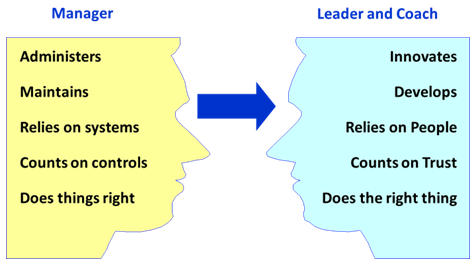The need to manage people effectively in a changing business environment underlines the need for scholarly research on the best personality traits of managers and leaders. CMI (2013) reveals that researchers in the field of organizational management and leadership have also been interested in interrogating effective approaches for the management of people and subordinates. The consensus among researchers has been advocating for participative and consultative approaches to leadership and management as opposed to traditional approaches of command and control. However, CMI (2013) confirms that the approaches to management and leadership vary depending on circumstances and individual characteristics. This section responds to this point of view. It also compares and contrasts the similarities and differences between management and leadership.
Leadership and management differ in the manner of getting things done in an organization. In a video by Johannsen (2009), the speaker reveals how leadership inspires followers to work collectively to achieve specific goals. Leadership is an organizational practice that not only influences followers (employees) but also leaders in a manner that ensures that organizational objectives are achieved through change (Kedharnath 2011). This claim suggests that leaders get things done by influencing people. On the contrary, management focuses on commanding people. Managers get people to work for an organization while leaders wish to make people within an organization follow them. Figure 2 shows a comparison between a leader and a manager in terms of their roles.

While leaders are driven by achievements, managers struggle to achieve results as their main outcome. Their approach to attaining outcomes also varies. Walumbwa, Mayer, Wang, Wang, and Workman (2011) assert that leaders look for problems to develop new and innovative solutions. While managers focus on risk-aversion, leaders embrace risk-taking. Managers get involved in decision-making processes in an attempt to appeal to persons who are above them in the organizational hierarchy. In contrast, leaders take the role of facilitating the decision-making process to appeal to their hearts (Walumbwa et al. 2011). In this process, they deploy leadership traits such as transformational leadership, consultative, participative, transactional, and democratic traits among others. On the other hand, managers deploy dictatorial, transactional, autocratic, democratic, and authoritative styles among other qualities that may ensure coercion of the subordinates. Styles of leadership and management suggest the existence of similarities between the two approaches to getting things done in an organization.
An example of management and leadership in organizations is Microsoft Company, especially under the leadership of Bill Gates. This organization succeeded where other businesses had failed, including diversifying its operations and expanding on the global front. Bill Gates is an example of a leader who practiced effective management and leadership (Keeffe & Darling 2008). Microsoft is an organization that operates in different parts of the world. Although the founder is no longer at the top of the organization, the leadership and management roles are still persistent in the organization. Another example of a company with effective use of leadership and management is Google Company, which exemplifies the CMI (2013) point of view while it endeavors to introduce new products such as Google maps. The evident wide range of production by this company is partly popular because the company has a working leadership and management in place. Decisions are easily made regarding marketing and innovation. Hence, this company presents a perfect example of the role of leadership and management in organizations. During this time, creativity, innovation, and the capacity to influence people to innovate and create were highly desired. Hence, leadership was quite essential as it focused on originality as opposed to imitation, which is an aspect of management. For Google Company, while developing Google maps, imitation was not even an alternative since there was no other company to imitate or benchmark.
As a team member, I would like to be managed and led. Being led is important since all team members prefer being associated with people who not only give directions but also influence others to do what is right. Leadership and management must apply hand in hand within my work team. In a new economy that depends highly on the creativity and innovation of people to enhance organizational success, people do not function as cogs, which cannot be differentiated in work environment settings. As a work team member, I not only look upon the manager for allocation of tasks. Rather, the definition of the purpose of the allocated tasks is important. Hence, managers need to organize work and nurture my skills rather than focusing on efficiency maximization. Leadership that enhances my skill development and/or inspires me to achieve results is particularly important. The blending of management styles and leadership strategies is my preferred management and leadership approach.
References
CMI 2013, Understanding Management Styles Checklist 236, Chartered Management Institute, London.
Johannsen, M 2009, The Importance of Leadership, video recording, Video Education Australasia, Bendigo, VIC, Web.
Kalshoven, K & Hartog, D 2009, ‘Ethical Leader Behaviour and Leader Effectiveness: The Roles of Prototypicality and Trust’, International Journal of Leadership Studies, vol. 5 no. 2, pp. 102-118.
Kedharnath, U 2011, ‘The influence of leaders’ implicit followership theories on employee outcomes’, Organisational Behaviour and Human Decision Processes, vol. 7 no. 5, pp. 1-24.
Keeffe, M & Darling, J 2008, ‘Transformational Crisis Management in Organisation Development: The Case of Talent Loss at Microsoft’, Organisation Development Journal, vol. 26 no. 4, pp. 43-58.
Walumbwa, F, Mayer, D, Wang, P, Wang H & Workman, K 2011, ‘Linking Ethical Leadership to Employees’ Performance: The Roles of Leader-Member Exchange, Self-Efficacy, and Organisational Identification’, Organisational Behaviour and Human Decision Making Processes, vol.115 no.2, pp. 204-213.